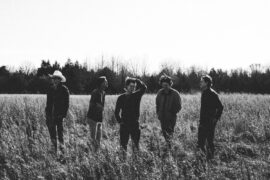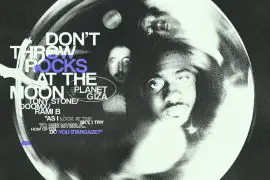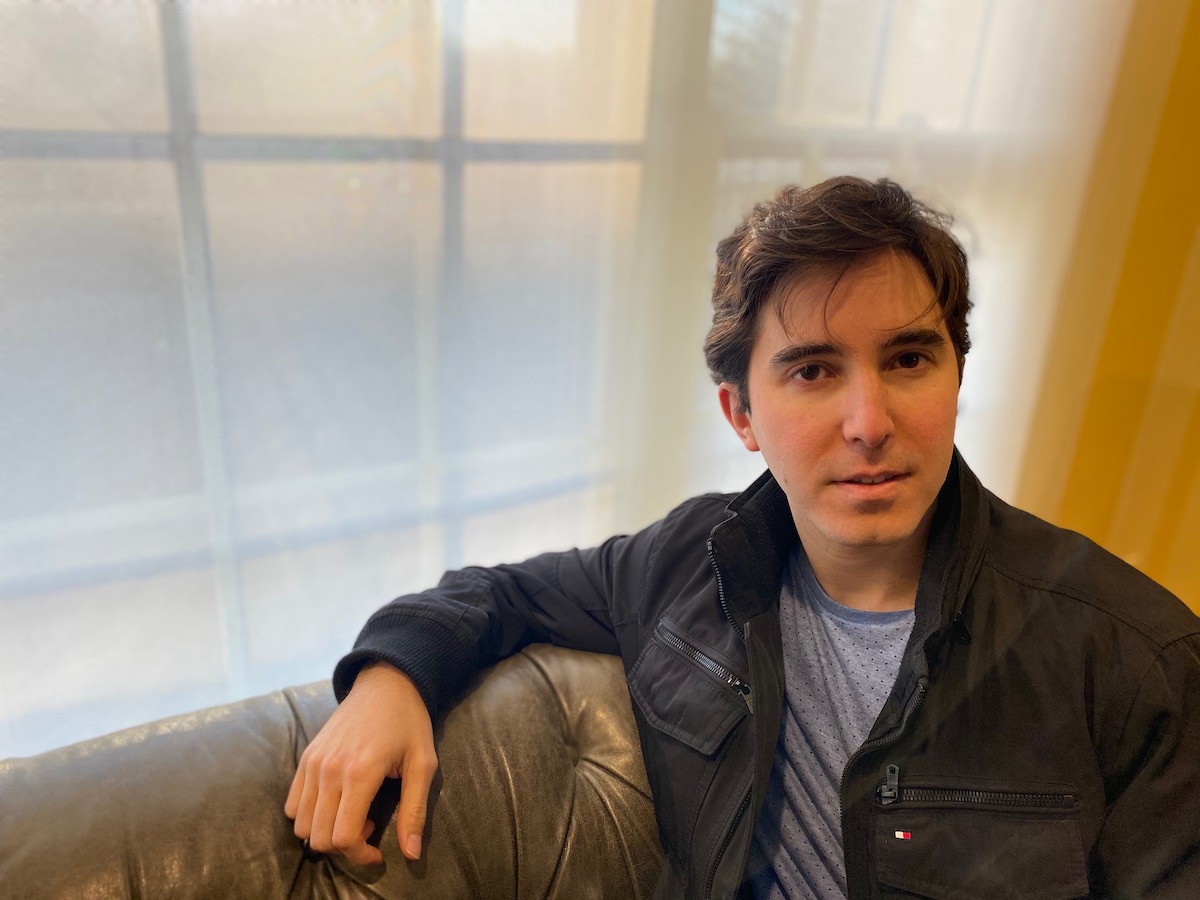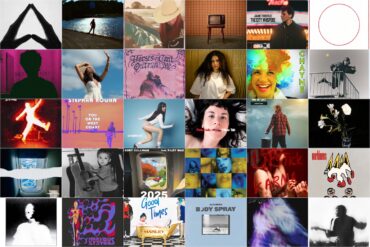Singer/songwriter Noah Henderson’s “tired of healing,” “floorboards,” and “nothing worse than almost having you” display the chinks in the armor and the emotional vulnerability of a soft-spoken musical polymath. And he has more on the way.
Stream: “nothing worse than almost having you.” – Noah Henderson
Going into this conversation with LA-based singer/songwriter Noah Henderson, the knowledge of his soft-spoken nature, even based off the minimal non-music content of him available, presented the possibility of a clipped 12- to 15-minute chat that never quite reaches beyond the basic necessities.
Henderson, currently experiencing a surge of attention and virality on social media for recent releases such as “floorboards” and “tired of healing.,” comes off as intensely inward in what could be thought of as a natural state of mellow. When paired with friend and frequent collaborator pj frantz, a fellow LA-based artist and a blatant extrovert if there ever was one, Henderson’s more reserved demeanor is even more prominent.
Those assertions were quickly proven incorrect, as, for nearly an hour, Henderson slowly and methodically navigated questions that, on his end, likely felt self-aggrandizing, but contributed to the overall dialogue of an artist with both an amplified amount of technical musical prowess and a vigorous attachment to his craft attempting to convey his stories and songs to others.
His latest release, “nothing worse than almost having you,” is out now.

Prior to jumping into music as his full-time gig, Henderson majored in real estate and data analytics with the hope of finding stable work in an otherwise “normal” field.
Ultimately, he needed more.
“I have a very entrepreneurial spirit about me,” he tells Atwood Magazine. “I’d rather build something for myself, and impact people. I have this conviction that I need to make music and share what’s on my heart, because it’s helping me. If it helps me, maybe it’ll help other people.”
If he were to have failed, he knew there would always be another option. Thus far, he has not needed one. “Music is so much more fun,” he says with a sly smirk. “I’m very spontaneous. I’m a figure-it-out-as-you-go, fake-it-till-you-make-it, finesse it, type of person. Music is all of that.”
When thrown the most egregious softball question, “Do you consider yourself a prodigy,” Henderson chuckled, knowing he would not get away with a cop out answer of, ‘No, haha, what do you mean?’ and centered himself for it.
“I think I’m a lot more in tune than most people are, musically,” he offers, after some thought. “I guess I have more of a sense of being able to connect emotion to music, and to make them, almost, the same. I don’t always see that in other people. The words they’re saying don’t necessarily reflect how the music makes me feel, and so, in that sense, I’d say I’m… favored.”

That idea of connecting emotion to music does not exist without the ability to communicate, externally, through the art form.
Henderson believes he possesses that trait, saying that, like many others, music feels like a different language he can easily interpret.
“I think I am best expressed through music,” he admits. “I’m very chill… very composed, I’d say. I don’t talk that much. When I do talk, it’s when I have something to say and there’s more weight… more value assigned to it. I’m very intentional. You only have so many lines in a song, and I think the way you can craft a story and express an emotion is all about the delivery. You can read lyrics out loud… sad lyrics, but when you put melody and music to them, it unlocks this extra 20% that you just can’t get through anything else.”
He feels this idea applies to his song “floorboards,” led by a stirring movie trailer-like piano-motif accompanying his airy falsetto:
Bury me under the floorboards
Hide away with the love you left before
Waste of a heart if it’s not yours
Strangers again and I’m not sure what you left for
Love me less, I’ll never forget you
I can’t stand to see you with someone else
With someone else
“I connect so much with my own music, but almost as if it wasn’t my music,” he says. “If you mute the vocals of ‘floorboards,’ … I KNOW what the song means without having the lyrics. That was a big moment for me. When I figured out how to say what I want to say without saying anything.”
A sudden subliminal drop in the production, followed by a perfectly synced crash return, around the midway point of the song was a significant occurrence. “When that drop hits, it’s like this longing or frustration,” he explains, equating the content to a love/hate feeling with an old flame. “When I was making it… I was making the layers for that drop for an hour, and I hadn’t actually listened to the thing. So, I pushed back, closed my eyes, and pressed play. When it dropped, I just started crying. I had never cried to a song and I was like, ‘Whoa, I just made myself cry to something that I made, and it expressed what I’m feeling right now.’”
“tired of healing,” similarly downtrodden melodically to “floorboards,” is enhanced by its grainy, ambient elements of sound… old radio static, indistinguishable voices.
Less abstract of a lyric than the latter, Henderson takes a version of himself, sincerely and directly at the end of his rope, and displays his emotional and mental suffocation:
Exhausted, and embarrassed
of the way I process…
Everything
It hurts to keep it in
But no one understands
I won’t fight it… I’m just tired of healing
And feeling like I never meant anything
“Healing just… takes forever,” he says. “It’s not a linear process at all. It’s… ‘Let’s make it through the day… let’s make it through the day,’ and then you finally lay down and it’s just silence. There’s no big moment in healing. You kind of just wake up after two years and think, ‘Huh… I guess I’m okay now.’ Musically, I think I was just trying to be as honest as possible with this song.”
These two songs, as well as “nothing worse than almost having you.,” all reflect fragments of the same story, and all explore different aspects of the grieving process, though slightly out of order.
“I have a lot of songs from that time period,” Henderson shares. “All the songs that are out now feel like staple pieces. In the fall, I’m going to put out an EP that kind of comes back to some of those feelings… but I feel like ‘nothing worse…,’ is the end of an era. It feels nice, at least internally, to be like, ‘Ok… all the ones that are weighing on me, those are all done, so now I can freely just make whatever I feel like.’”
As his career progresses, he continues to develop an understanding of the process of musical output, and the relationships that are developed between himself and the consumer. At this stage, the relationships do not feel parasocial, but more based on interpersonal connection, and the tangible serotonin generated from playing.
That idea translates to those beyond the small living room shows he and frantz have been using as warmup gigs for upcoming tours, and others within his immediate reach. “Someone messaged me the other day from this island that I’ve never heard of, saying, ‘Dude, I love your music!!,’ and I was like, ‘You don’t even speak my language,’” he says, still attempting to grasp his locational range. “Somehow the melodies and music effect people the same way, even if you don’t speak English. That’s more of what I’m tapped into… it’s not about just ‘making a pop song.’”
As it pertains to this topic, he didn’t stop there. “I think music is becoming something so much bigger than me,” he continued. “I realized, very early, what the ceiling was for it being about me. It has become about the vulnerability and tapping into something… a universal human experience of heartbreak, healing, and all the things no one talks about that co-exist in that space. When I hear a song that speaks to me, or speaks to a very niche part of my life, it feels way more intentional and real. Way bigger than just music.”

Beyond slowly comprehending the relationship between his music and the consumer, over time, Noah Henderson is also beginning to understand how to healthily coexist with his music, and the events that inspired it, despite still consciously feeling the weight of the emotions behind these songs.
“I listen to ‘floorboards,’ and I feel everything that I felt the day I made that song,” he says. “I have a different appreciation for it now than I did when I made it. It’s like a little time capsule… a little home video. The new music will come with new feelings, and new sounds. That’s the cool part about making music… you get to evolve as you see fit. You find comfort in sadness sometimes… you find comfort in nostalgia. But then it’s like, ‘Ok, that’s not real anymore… let’s get back to the present.’ That’s what I think those songs are at this point.”
— —
:: stream/purchase “tired of healing,” “floorboards,” and more ::
:: connect with Noah Henderson here ::
Stream: “nothing worse than almost having you.” – Noah Henderson
— — — —

Connect to Noah Henderson on
Facebook, Twitter, TikTok, Instagram
Discover new music on Atwood Magazine
© courtesy of the artist
:: Stream Noah Henderson ::


 © courtesy of the artist
© courtesy of the artist





